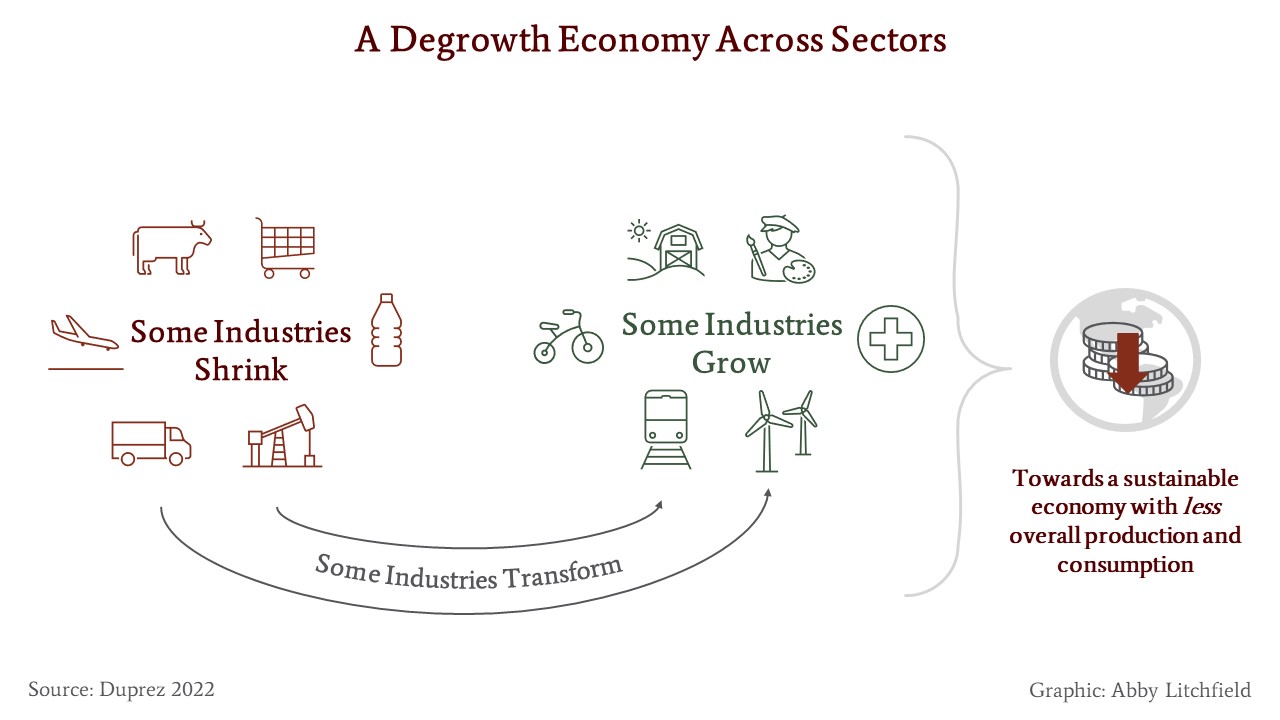Growth doesn’t have to be our economic goal. “Degrowth” provides an alternative for business and society.
“The Basics” provides essential knowledge about core business sustainability topics.
Our global economy is built for growth.
Governments pursue economic growth to compete with other countries and finance public services. Growing companies are praised as our model of success. Consumerism leads individuals to think that more is always better.
Today, growth has become part of the idea of human progress.
Yes, growth can have benefits, especially when its positive impacts are fairly distributed. But it also has serious drawbacks, including the increasing destruction of nature.
Could there be another way?
Some people recommend “green growth,” which means greater efficiency. But others call for moving beyond growth. They’re advocating an approach called “degrowth.”
This article describes the challenges associated with growth and the potential benefits of degrowth. We explain what the idea means and how businesses can act on it today.
Why Growth Causes Social and Environmental Problems
Since at least 1972, we’ve known that humanity is “using the world’s resources faster than they can be restored, and…releasing waste and pollutants faster than the Earth can absorb them.” That famous Limits to Growth report was updated in 2000 and 2020, finding the same result.
Current economic activities, focused on growth, are not sustainable over the long term.
How do we define growth? At a society-wide level, it’s Gross Domestic Product (GDP). GDP captures short-term economic growth but doesn’t consider other values: e.g. happiness, social relationships, or nature. Even the GDP’s inventor warned against using it to guide policy.
At the company level, too, pursuit of growth has drawbacks. Research shows that when companies prioritize short-term financial performance, other types of value take a hit. Social and environmental performance, R&D spending, and even long-term financial performance all fall.
“Green Growth” Is Not a Solution
You may have heard of “green growth,” sometimes also called eco-efficiency. This approach believes that more efficient use of natural resources can create a “win-win” of growth and sustainability.
How? Primarily through technological innovation. New technologies allow more efficient irrigation on farms, for example, or less wasteful manufacturing. The goal is to continue current production and outputs, but with less harm. In the energy sector, green growth pursues a carbon-free energy system that allows continued consumption and economic growth.
Green growth tries to separate (“decouple”) what is bad for the environment and what is good for the economy.
Unfortunately, research shows that separating environmental harm and economic growth is near-impossible. For example, with climate change, there’s no evidence that economies can “decouple” rapidly enough to meet the necessary goals through technology alone. Energy efficiency would need to improve by more than 7% per year, i.e. 10 times more than currently.
You may be familiar with some “green growth” approaches. If your company has adopted efficiency approaches, you may have seen improvements – but likely around the edges. Benefits are often marginal and slow. There can also be unintended consequences: e.g. “the rebound effect.”1
“Green growth” can be a distracting utopia. It promises a technological rescue – and so we delay taking necessary action.
Degrowth Focuses on Sustainability, not GDP
Degrowth could be the approach that gets us to the future we need. Here’s the full definition of degrowth, according to economist Timothée Parrique:
“A planned and democratic reduction of production and consumption in rich countries to reduce environmental pressures and inequality, while improving well-being.”
With “degrowth,” the economy focuses on well-being and sustainability rather than growth. Degrowth is a values change, aiming for a new meaning of success. Rather than focusing on accumulating more money, our collective goal becomes developing healthy social bonds and ecosystems.
Degrowth supporters tend to look at action at the level of a society or country—or even broader. They envision a widespread effort to find a different path.
The eventual outcome could be “post-growth” – a kind of “steady-state” economy where production and consumption are both relatively stable. The figure below shows what this might look like.
From Growth to a Post-Growth Economy

This transition can risk a recession, which is one reason why supporters emphasize a planned, democratic shift. Recommended policies to support degrowth include changes like:
- maximum incomes
- universal basic services
- democratic firm ownership (e.g. cooperatives or employee stock ownership plans)
- working time reductions
In many countries, it can be hard to imagine these policies taking effect. But degrowth ideas are still relevant to businesses today. And, they may be inevitable. Some research shows that in rich countries, the era of growth is already over – because of environmental regulation or limited resources.
Degrowth strategies can help us shift more smoothly into a new era, yet to be defined.
How Businesses Can Pursue Degrowth
Achieving degrowth takes place at the societal level: it includes policy change from governments. But companies can get involved too.
At the company level, actions directed toward degrowth can sound a lot like sustainability. In the report “Post-Growth for Business,” consultancy Prophil defines a company’s role in degrowth as is defined as being “sustainable environmentally (by respecting planetary boundaries), socially (by respecting the social foundation) and economically (by bringing prosperity).” (p.9).
It’s a version of sustainability that not every company may recognize, however, notes Ivey professor and Network for Business Sustainability Director Jury Gualandris. Sometimes sustainability is defined as improving the existing system — looking at ways to reduce harm but essentially keeping existing products, services, processes and business models.
In a degrowth model, companies will need to look for opportunities that contribute to net-zero, biodiversity and social justice. That likely means radically changing products, services, processes and business models, unless the business was developed with those goals in mind.
Prophil recommends that companies interested in degrowth:
Set strategic goals related to sustainability
Define purpose and develop governance to support these goals;
Use evaluation and accounting to measure sustainable performances and guide decision making;
Leave or transform unsustainable activities.
Here are two more specific actions businesses can take.
1. Aim for “sufficiency” rather than just efficiency.
“Sufficiency,” a key concept in degrowth, means “enough to meet one’s needs.” When customers consume less, they reduce demand and production (Green growth or eco-efficiency, by contrast, maintains production levels.)
Companies can also be “sufficient,” by capping growth at the right size for their sustainability targets. For example, Lamazuna, a household product company, has capped its growth at 150 employees and focuses on providing an ecological model to other companies.
Keep focused on meeting real needs and not creating new ones. Part of the democratic emphasis in degrowth is trying to understand people’s real needs.
2. Spread positive impact
Industries need leaders to follow. Any new direction requires standards and examples: what a recent Harvard Business Review article called “degrowth-oriented standard setting.”
Perhaps your company can provide some of these models. For instance, the company Fairphone is creating more ethical and repairable phones to fight against obsolescence and waste. Patagonia and its “anti-growth” strategy promotes sustainable clothing and fight overconsumption.
Degrowth Will Vary Across Sectors
Even if the overall size of the economy will decrease, not all businesses will need to shrink. Degrowth calls for reducing sectors or products that are unsustainable in the long run and growing those that aid sustainability. It’s a sort of “selective degrowth,” that considers what is worth producing as well as how it is produced.
Sectors that shrink could include fossil fuel sector, aviation, large cars and trucks, cattle ranching, etc.). Growth would occur in the rail sector, low-carbon energies, health, art, etc. There’s also room for “Small Beauties,” which achieve sustainability by limiting their size – for example, a small business that serves its community.
What if a company’s activities are based on an unsustainable sector? It’s time for strategic repositioning. There is a lot of opportunity there. Less meat consumption brings opportunities in meat substitutes. Less flying aids other travel industries, like trains.
Tell the Degrowth Story
Growth occupies a central place in our economic story. But it’s a story that can mislead.
“Growth is neither essential to [company] survival, nor always profitable, nor even something that CEOs necessarily want,” reports consultancy Prophil.
As individuals, businesses, and societies, we can begin to step away from the growth ideal. We will find an area for innovation: new ways of doing businesses, beyond the unsustainable quest for economic growth.
Systems expert Jay Forrester laid out the challenge: “One of the biggest management problems is going to be to understand how to manage a successful non-growing company”.
And what about you: How does your company measure success beyond growth?
About the Series
“The Basics” provides essential knowledge about core business sustainability topics. All articles are written or reviewed by an expert in the field. The Network for Business Sustainability builds these articles for business leaders thinking ahead.
About the Author
Charles Duprez is a PhD student in administration at the Université du Québec à Montréal (UQAM) and in Sociology at the École des Hautes Études en Sciences Sociales (EHESS). His research interests lie in social justice in the ecological transition with aspecial focus on the post-growth economy and on the transformation of forms of social solidarity. Before his PhD, Charles worked for several years for the Network for Business Sustainability as a digital strategy manager.




Add a Comment
This site uses User Verification plugin to reduce spam. See how your comment data is processed.This site uses User Verification plugin to reduce spam. See how your comment data is processed.